If you’re a concerned reptile owner wondering how long can bearded dragons go without food, you’re not alone. Whether it’s due to brumation, stress, or a sudden change in environment, a loss of appetite can be alarming—especially for first-time beardie parents. While these hardy reptiles can sometimes go days or even weeks without eating, understanding how long can bearded dragons go without food safely is crucial to keeping them healthy and thriving.
In this comprehensive guide, we’ll break down the key factors that affect a bearded dragon’s ability to fast, explain when it’s normal versus when it’s a red flag, and share expert-backed tips to help you support your pet during these periods. Whether you’re dealing with a picky juvenile or a brumating adult, you’ll find everything you need to know right here.
How Long Can Bearded Dragons Go Without Food? Key Facts Every Owner Should Know
Understanding how long bearded dragons can go without food is essential for spotting normal behavior versus signs of trouble. In this section, we’ll explore how age, health, environment, and routine impact their fasting limits—and when it’s time to intervene.
Safe Fasting Duration for Bearded Dragons by Age
The length of time a bearded dragon can safely go without food depends heavily on age. Baby bearded dragons need daily feeding due to rapid growth. Going without food for more than 24–48 hours can be dangerous for them. Juvenile dragons have slightly more flexibility but should not fast for more than 2–4 days unless under veterinary supervision.
Adult bearded dragons, on the other hand, can tolerate longer fasting periods. In healthy conditions and proper hydration, they may go up to 1–2 weeks without eating, especially during natural cycles like brumation. However, this is only safe if the dragon is not underweight or ill.
Always monitor your dragon’s energy, behavior, and weight during fasting. Age-specific care is critical to avoid complications, and owners should respond quickly if a baby or juvenile skips meals. When in doubt, consult a reptile vet to avoid unnecessary risks.
How Long Can a Bearded Dragon Survive Without Eating or Water?
A bearded dragon can go without food for up to two weeks, but survival without water is far more limited. Hydration plays a critical role in survival during periods of fasting. On average, a healthy adult dragon may survive 3 to 5 days without water, depending on temperature and humidity.
Younger dragons are at higher risk because they dehydrate more quickly. Without proper hydration, their organs may begin to shut down, even if they haven’t shown clear signs of distress.
Brumating dragons often reduce both eating and drinking, but they still absorb moisture from their environment or occasional soaks. If your beardie is refusing food and water at the same time—and isn’t brumating—this can indicate illness or stress.
Always check for dehydration signs like sunken eyes, wrinkled skin, or lethargy. Offer water through shallow dishes or gentle misting. If hydration cannot be maintained, consult a reptile vet promptly to prevent serious health consequences.
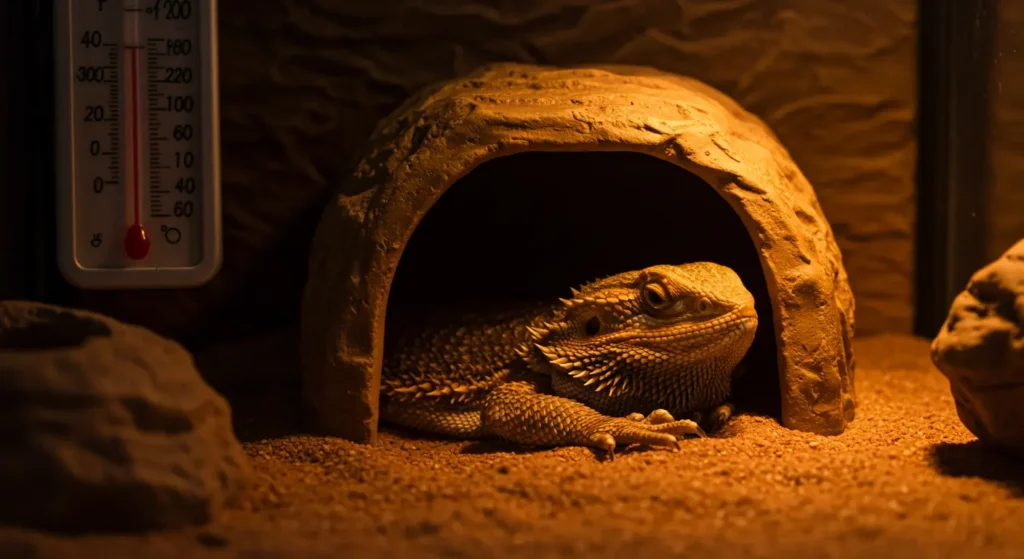
Factors That Influence Food Deprivation Tolerance in Bearded Dragons
Not all bearded dragons respond to fasting the same way. Several key factors determine how well your dragon can tolerate going without food. The most important include age, overall health, hydration status, environmental temperature, and lighting setup.
Younger beardies have high metabolic rates and need frequent feeding. Older, healthy adults can endure fasting longer—especially during brumation. Proper UVB lighting and basking temperatures are essential for digestion and nutrient absorption. When these conditions are off, appetite can drop quickly.
Stress is another major factor. Loud environments, frequent handling, or sudden changes in habitat may cause appetite loss. Parasites or illness can also suppress eating, especially if left untreated.
Each of these elements contributes to how long your bearded dragon can safely go without food. To reduce the risk of long-term fasting, owners should aim for stable tank conditions, routine feeding, and regular health checks.
When Skipping Meals Becomes a Health Risk for Bearded Dragons
Missing one meal isn’t always a cause for concern, especially in healthy adult dragons. But ongoing refusal to eat can quickly turn into a health risk, especially in young or underweight bearded dragons. The danger increases when appetite loss is paired with lethargy, weight loss, or signs of dehydration.
In baby dragons, skipping meals for more than 24–48 hours may stunt growth or lead to metabolic bone disease. Juveniles are more resilient but still shouldn’t go more than a few days without food. Adults have higher tolerance, but after 5–7 days, owners should investigate the cause.
Signs that a missed meal may signal a deeper issue include dark stress marks, hiding, glass surfing, or sunken eyes. Weigh your dragon regularly to monitor changes. If there’s a rapid weight drop or signs of illness, consult a vet immediately.
Never wait too long, assuming it’s “just a phase.” Early intervention is key to avoiding serious complications in bearded dragons refusing to eat.
Top Reasons Your Bearded Dragon Might Refuse to Eat or Show Appetite Loss
When a bearded dragon suddenly refuses food, it can leave owners feeling worried and confused. While occasional appetite changes are normal, persistent food refusal often points to underlying issues. In this section, we’ll explore the most common reasons your bearded dragon might stop eating and how to address each one effectively.
Environmental Stress That Affects Feeding Behavior in Bearded Dragons
Environmental stress is one of the most overlooked causes of appetite loss in bearded dragons. Changes in the enclosure—like new decorations, unfamiliar smells, or shifting the tank to a new room—can unsettle them. Loud noises, excessive handling, or the presence of other pets can also cause stress and disrupt feeding habits.
Bearded dragons thrive on stability. When their habitat feels unpredictable or threatening, they may respond by refusing to eat. Even bright lights left on overnight or fluctuating temperatures can disturb their sense of safety.
To reduce stress-related fasting, maintain a consistent tank layout, regulate the photoperiod, and avoid unnecessary disturbances. If you’ve recently introduced changes and your beardie has stopped eating, try returning to the previous setup. Giving them a few days of minimal handling and peace can help restore their normal appetite. Monitor behavior closely—hiding, dark coloration, and glass surfing are common signs of environmental stress.
Common Health Issues That Cause Appetite Loss
Several health issues can cause a bearded dragon to stop eating, and some may not show symptoms right away. Internal parasites are a frequent cause, especially in dragons that eat live insects or come from shared environments. Infections, impaction, and metabolic bone disease can also interfere with normal feeding behavior.
When a beardie is sick, they may become lethargic, avoid basking, or hide for long periods. Loss of appetite is often the first visible symptom. If your dragon hasn’t eaten for more than a few days and shows physical changes—like bloating, twitching, or sunken eyes—it’s time to consult a reptile vet.
Regular health checks and clean enclosure conditions reduce the risk of illness. Avoid feeding wild-caught insects or overly large prey. A fecal test can quickly confirm if parasites are to blame. Treating the root health issue is the only way to restore your beardie’s appetite in these cases.
Poor Lighting, Cold Temps & Their Impact on Digestion
Proper lighting and temperature are critical for a bearded dragon’s digestion. Without adequate UVB exposure, they can’t metabolize calcium effectively, which leads to health problems and a reduced appetite. Similarly, a low basking temperature can slow digestion, making your beardie feel too sluggish to eat.
The basking area should be between 95°F and 110°F, depending on age, and the cool side should stay around 75°F to 85°F. UVB bulbs need to be replaced every 6–12 months to stay effective. Without these, your dragon may struggle to break down food or absorb nutrients, leading to feeding refusal.
Always double-check temperatures with a digital thermometer and ensure the UVB light covers the correct portion of the tank. Beardies rely on heat and light to simulate their natural desert environment. If the lighting or temps are off, correcting them often results in a noticeable return of appetite within a few days.
Feeding Mistakes and Poor Diet Choices
Sometimes, bearded dragons stop eating because of simple feeding errors. Offering the wrong types of food—or feeding too much of the same thing—can lead to boredom or nutritional imbalances. For example, feeding only lettuce or fruit lacks the variety and nutrients a beardie needs.
Another common mistake is offering prey that’s too large. A good rule is: never feed insects wider than the space between your dragon’s eyes. Oversized food can lead to impaction or choking, both of which discourage future eating.
Feeding cold insects or not gut-loading prey can also cause issues. Beardies prefer warm, active insects and fresh, vibrant greens. Try rotating between feeders like dubia roaches, black soldier fly larvae, and silkworms, alongside safe vegetables like collard greens and squash.
A varied and balanced diet is the best way to keep your dragon eating consistently. Review what you’ve been feeding and adjust as needed to reignite their interest in food.
For a deeper dive into the most common causes of feeding refusal, check out our full guide on why your bearded dragon isn’t eating.
Understanding Brumation: A Natural Reason for Not Eating
Brumation is a natural behavior in bearded dragons that often confuses first-time owners. During this dormancy-like state, it’s completely normal for your beardie to eat very little—or not at all. In the next section, we’ll break down what brumation is, why it happens, and how it affects your dragon’s appetite and health.
What Happens During Brumation in Bearded Dragons?
Brumation is a natural, seasonal slowdown in activity and metabolism that affects many reptiles, including bearded dragons. During brumation, your dragon may sleep for extended periods, hide more often, and avoid food altogether. This process typically happens during the cooler months, mimicking how wild beardies respond to winter.
Unlike hibernation in mammals, brumation doesn’t involve deep sleep. Your dragon may wake occasionally to drink water or reposition but will remain largely inactive. Their digestive system slows down significantly, which is why they stop eating. It’s important to note that brumation is not caused by illness.
Still, it’s critical to ensure the dragon is healthy before assuming brumation is the reason for appetite loss. Parasites or underlying illness can look similar. If you’re unsure, get a fecal test and a basic health check from a reptile vet. Once brumation is confirmed, it’s best to let nature take its course.
Appetite Changes During Reptile Dormancy
During brumation, it’s completely normal for a bearded dragon to stop eating. Their metabolism slows down drastically, and their body no longer needs energy from food. Appetite loss in this state isn’t dangerous—as long as your dragon is healthy and well-hydrated before entering brumation.
You might notice your beardie ignoring even their favorite foods or turning away from insects they would usually chase. Some dragons may reduce food intake gradually before stopping altogether. Others may quit eating suddenly.
Don’t try to force-feed your dragon during this time. Instead, monitor their weight and ensure fresh water is always available. Soaking the dragon once every 2–3 weeks during dormancy can help maintain hydration. Appetite typically returns once brumation ends, but the timing can vary for each dragon.
Preparing Your Beardie for a Safe Brumation Period
If you think your bearded dragon is entering brumation, preparation is essential for their safety. First, schedule a reptile vet checkup to rule out illness. A fecal exam can confirm that parasites aren’t behind the drop in activity or appetite. Once your dragon is cleared, you can begin adjusting their setup.
Gradually reduce basking hours and daytime temperatures to simulate seasonal changes. Avoid offering food during the final days before full brumation, especially if your dragon stops basking. Ingested food may rot in their digestive system if they don’t have enough heat to digest it.
Provide a dark, secure hiding spot where your dragon can feel safe. Keep the enclosure quiet and undisturbed. Clean water should always be accessible. Brumation can last from a few weeks to several months. Your role is to keep conditions stable and avoid interference unless signs of illness appear.
What to Expect When Brumation Ends
When brumation ends, your bearded dragon will gradually become more active. You may notice them emerging from their hide more often, basking again, and showing curiosity. Appetite may return slowly or all at once—this depends on the dragon’s age and health.
Don’t panic if they don’t eat right away. It’s common for dragons to take a few days or even a week to fully regain their appetite after dormancy. Offer small amounts of easily digestible foods like greens and soft insects first. Avoid overfeeding right away.
Make sure the basking temperatures and UVB lighting are back to full daytime levels. Track your dragon’s weight, hydration, and energy levels. If they remain inactive or continue refusing food after a week, a vet check is recommended. For most healthy beardies, their normal routine resumes smoothly with just a bit of patience.
What to Do If Your Bearded Dragon Stops Eating Suddenly
If your bearded dragon suddenly stops eating, it can be alarming—especially if there are no obvious signs of illness. While occasional appetite dips happen, a sudden refusal to eat often signals an issue that needs attention. This section walks you through practical steps to troubleshoot the problem and help your beardie get back on track.
Troubleshooting Tips for Bearded Dragon Appetite Loss
When your bearded dragon refuses food, begin by checking the basics. Confirm that your basking temperatures and UVB lighting are correct. Inadequate heat or lighting can reduce your beardie’s ability to digest food, leading to appetite loss.
Next, assess their environment. Is the tank too noisy or has anything changed recently? Stress from relocation, new decor, or nearby pets can make beardies stop eating. Look for signs like hiding, color changes, or glass surfing.
Check the food you’re offering. Has it gone stale? Are the insects too large? Your dragon might be rejecting it for a specific reason.
Track their weight and stool. If there’s rapid weight loss, constipation, or diarrhea, something more serious may be going on. Always clean their enclosure regularly. Poor hygiene can cause illness and lower their interest in eating.
Troubleshooting step by step can help you identify the cause and fix it before it worsens.
Home Remedies and Safe Foods to Reintroduce
Once you’ve ruled out major issues, try gentle home remedies to rekindle your dragon’s appetite. Begin with warm soaks—lukewarm baths for 15–20 minutes can ease mild impaction or dehydration, both of which reduce appetite.
You can also try offering their favorite feeders, like dubia roaches or waxworms, in small portions. Be sure they’re moving—dragons often respond to live movement. If they reject insects, offer soft, easy-to-digest foods like mashed squash, sweet potato, or baby food (no additives).
Ensure all food is bite-sized and appropriate for your dragon’s age. Use feeding tongs to encourage interest and simulate prey behavior.
Hydration is critical—drip water on their snout or mist greens if they won’t drink from a dish.
Feeding them by hand may help reestablish routine, but never force-feed unless advised by a vet. Gentle encouragement and appealing, safe food choices can often get your dragon eating again.
Appetite Stimulants: Do They Work for Beardies?
Appetite stimulants are sometimes recommended when a bearded dragon refuses to eat for an extended period. These may include reptile-safe supplements or even prescription treatments from exotic vets. However, they’re not a first-line solution.
Milder options include critical care feeding powders, such as Oxbow Carnivore Care, which are mixed with water and offered via syringe. These provide nutrition during recovery, but should only be used under supervision.
Other natural appetite boosters include bee pollen dusted on food or reptile-safe multivitamins. These add flavor and scent, which can trigger feeding interest.
Avoid using human medications or over-the-counter pet store stimulants without guidance—they can be harmful or ineffective.
Appetite stimulants can help temporarily, but they don’t fix the root cause. Use them only after you’ve addressed lighting, stress, and hydration. Always consult a reptile veterinarian before giving anything beyond basic nutrition.
Knowing When to Call a Reptile Vet
If your bearded dragon hasn’t eaten for several days and shows signs of distress, it’s time to involve a reptile vet. Red flags include visible weight loss, lethargy, sunken eyes, or abnormal poop.
Other warning signs include bloating, twitching, or refusing to bask. If your dragon stops drinking water or becomes unresponsive, don’t wait.
Even if your beardie seems calm, prolonged fasting without cause could point to parasites, impaction, or organ issues. A vet can perform diagnostic tests, including X-rays and fecal exams, to rule out serious problems.
Reptile vets can also provide safe appetite stimulants or hydration therapy if needed. Early intervention improves recovery time and reduces the risk of complications.
It’s better to be cautious. A simple vet visit can give peace of mind and a treatment plan to help your beardie bounce back safely.
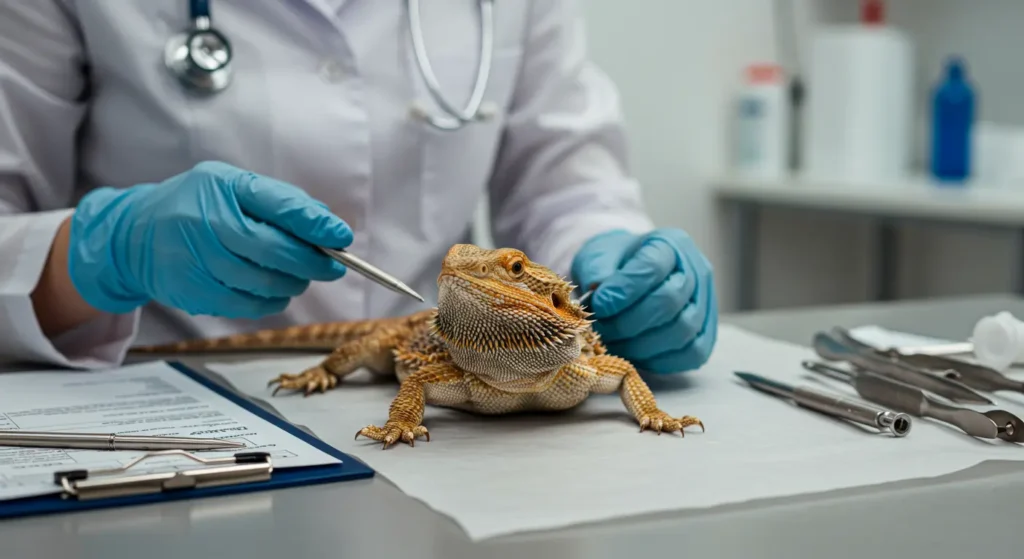
How to Prevent Your Bearded Dragon From Refusing Food
Preventing food refusal in bearded dragons is often easier than dealing with it after it starts. By maintaining the right habitat conditions, offering a balanced diet, and minimizing stress, you can keep your beardie healthy and eating consistently. This section covers the most effective strategies to help your dragon avoid appetite loss in the first place.
Creating a Consistent Feeding Schedule
Bearded dragons are creatures of habit, and their feeding routine should reflect that. A consistent schedule not only promotes healthy digestion but also helps regulate their appetite. Feeding your beardie at the same time each day builds a predictable rhythm they can rely on.
Baby dragons need to eat 2–3 times per day, while juveniles typically eat twice. Adults do best with one meal a day. Always feed during the active part of the day, ideally in the morning, when they are basking and alert. This ensures they have enough time to digest their food properly before bedtime.
Avoid feeding randomly or skipping meals without cause. Irregular routines can confuse your dragon and lead to appetite issues. Using a feeding log helps track consistency and spot early signs of changes in eating behavior.
A routine schedule gives your bearded dragon a sense of security. It also helps you stay proactive with their care and nutritional needs.
Maintaining Proper UVB and Temperature Levels
Bearded dragons rely on proper lighting and temperature to digest food and stay healthy. Without the right setup, even a good diet won’t be enough to keep them eating. UVB lighting helps them absorb calcium and supports overall metabolism.
Use a high-quality UVB bulb, such as a T5 HO 10.0, and replace it every six to twelve months. Place it above the basking area without any barrier between the bulb and your dragon. Keep the basking zone between 95°F and 110°F, and the cool side between 75°F and 85°F.
Use digital thermometers to monitor these temperatures accurately. Poor lighting or cold zones can reduce your dragon’s energy levels and delay digestion, leading to food refusal.
A proper heat gradient combined with strong UVB lighting is essential for both physical and digestive health. When these elements are off, your dragon may lose their appetite—even if nothing else has changed.
Offering a Balanced, Varied Diet for Optimal Health
Bearded dragons need a diverse and balanced diet to stay healthy and interested in food. A lack of variety can cause boredom, while improper nutrition can lead to serious health problems. A good meal plan includes a mix of insects, greens, and supplements. For example, besides the usual greens, you might wonder can bearded dragons have spinach? Simplified guide and how it fits safely into their diet. Knowing what greens are best keeps your beardie happy and healthy.
Young dragons require more protein, so focus on feeder insects like dubia roaches, crickets, or black soldier fly larvae. Make sure they’re gut-loaded before feeding. Adults, on the other hand, need more vegetables—offer collard greens, mustard greens, squash, and occasional fruit as treats.
Dust food with calcium and vitamin D3 powder a few times a week to prevent deficiencies. Keep portions manageable—don’t feed prey that’s wider than the space between your dragon’s eyes.
Always provide clean water and consider misting or shallow soaking to support hydration. Rotating food types keeps meals interesting and ensures your dragon receives a full range of nutrients.
Reducing Beardie Stress and Encouraging Healthy Behavior
Stress is one of the leading causes of appetite loss in bearded dragons. Fortunately, it can be managed—and even prevented—with the right care. A stable, calm environment is key to reducing anxiety and keeping your beardie eating well.
Avoid frequent changes in their tank setup or lighting schedule. Loud noises, other pets, or overhandling can overwhelm your dragon and cause them to hide or stop eating.
Create a predictable routine that includes gentle handling and daily interaction. Use slow, reassuring movements, especially when they’re young or newly rehomed.
Enrichment is just as important.
Frequently Asked Questions
How long can a baby bearded dragon go without eating?
Baby bearded dragons should not go more than 24–48 hours without food. Their rapid growth requires daily protein and nutrients. If your baby dragon isn’t eating, act quickly and consult a reptile vet.
Is it normal for a bearded dragon to stop eating during brumation?
Yes, it’s completely normal. During brumation, bearded dragons often stop eating and become inactive for weeks or even months. As long as your dragon is hydrated and otherwise healthy, this is not a concern.
Can bearded dragons survive a week without food?
Healthy adult bearded dragons can survive up to a week without food, especially if they are hydrated and conditions are stable. However, this isn’t ideal. Monitor their behavior and weight closely.
What should I do if my bearded dragon refuses food but acts normal?
If your dragon seems active but isn’t eating, check the tank temperature, lighting, and diet variety. Stress, boredom, or minor environmental issues are often the cause. Try offering favorite foods and monitor for changes.
When should I be worried about my bearded dragon not eating?
Be concerned if your dragon hasn’t eaten for more than 5–7 days, especially if it’s showing signs of illness like lethargy, weight loss, or hiding. In this case, a vet visit is recommended.
Do bearded dragons need to eat every day?
Young dragons need to eat 2–3 times per day. Adults can eat once a day or even every other day. Their needs change with age, health, and activity level.
Can dehydration cause appetite loss in bearded dragons?
Yes. Dehydration can lead to sluggishness, digestion issues, and food refusal. Always provide fresh water, mist greens, and offer weekly soaks to support hydration.
What foods help stimulate appetite in bearded dragons?
Try offering live, fast-moving insects like dubia roaches or waxworms. Soft veggies like squash or sweet potato puree can also help. Adding a light dusting of bee pollen or reptile vitamins may boost interest.
Conclusion
Understanding how long bearded dragons can go without food is essential for every responsible reptile owner. While healthy adults can sometimes fast for a few days—or even longer during brumation—extended periods without eating can signal a deeper issue. Factors like age, habitat conditions, stress, and illness all play a role in your dragon’s appetite.
The key is to stay observant. Monitor their behavior, weight, hydration, and environment regularly. Establishing a consistent routine, offering a varied diet, and maintaining proper lighting and temperatures can prevent most feeding problems before they start.
If your bearded dragon ever stops eating suddenly or shows signs of distress, don’t hesitate to seek veterinary advice. Early action can make all the difference.
With the right care, knowledge, and attention, your bearded dragon can thrive—hungry days included.

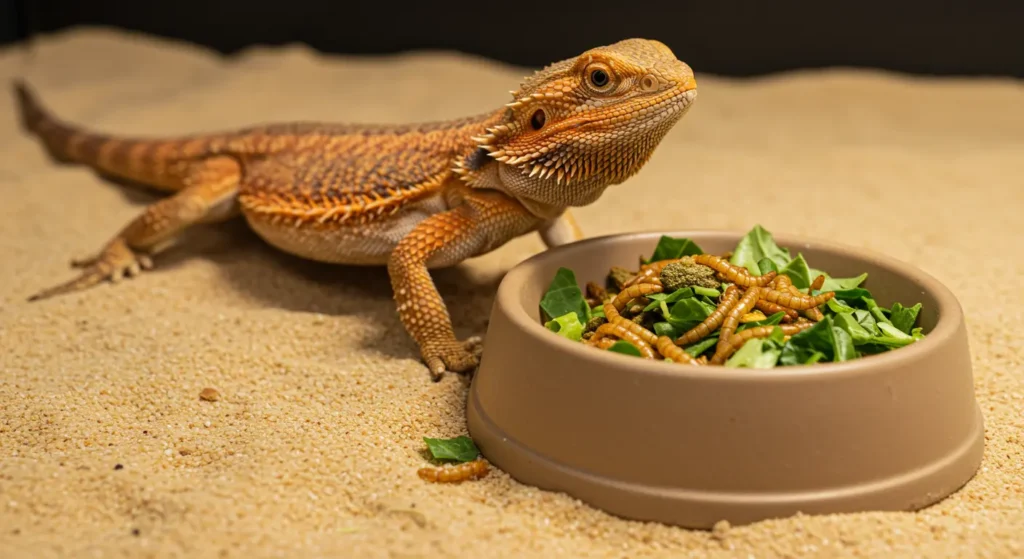
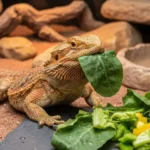
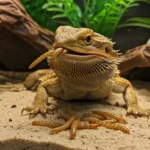
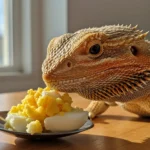
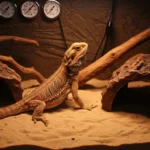
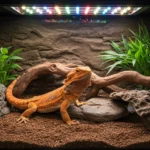
1 thought on “How Long Can Bearded Dragons Go Without Food? Full Guide”